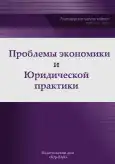Digitalisation of Selected Police Functions
- Authors: Karagodin A.V.1, Krupennikova K.K.1
-
Affiliations:
- Putilin Belgorod Law Institute of Ministry of the Interior of Russia
- Issue: Vol 18, No 3 (2022)
- Pages: 179-183
- Section: Articles
- URL: https://bakhtiniada.ru/2541-8025/article/view/147129
- ID: 147129
Cite item
Abstract
Full Text
##article.viewOnOriginalSite##About the authors
Alexander V. Karagodin
Putilin Belgorod Law Institute of Ministry of the Interior of Russia
Email: ann_karagodina@mail.ru
Cand. Sci. (Law), Associate Professor; professor at the department department of administrative and legal disciplines Belgorod, Russian Federation
Kristina K. Krupennikova
Putilin Belgorod Law Institute of Ministry of the Interior of Russia
Email: krupennikovakristina@yandeх.ru
faculty of interrogator training Belgorod, Russian Federation
References
- Avetisyan A.D., Ryasov A.A., Zhigalova G.G., The use of modern educational technologies in training of district police officers // The world of science, culture, education. 2022. No. 1 (92). P. 53-56.
- Eremchenko V.I. Analysis of foreign experience in using 3D scanners at the scene of an accident and prospects for their implementation in the activities of the Russian police // Bulletin of the Krasnodar University of the Ministry of Internal Affairs of Russia. 2021. No. 1 (51). P. 49-52.
- Zhdanov Yu.N., Ovchinsky V.S. Cyberpolice of the XXI century. International experience. M.: International relations. 2020. 288 p.
- Kostyuk A.V. Functional criteria of the modern mechanism of law enforcement activities of the police // Bulletin of the Moscow University of the Ministry of Internal Affairs of Russia. 2020. No 7. P. 171-173.
- Latypov A.I. Foreign experience in the application of information technologies in law enforcement // StudNet. 2021. No. 4. pp. 42-50.
- Latypov A.I. Problems of application of information technologies in law enforcement // StudNet. 2021. No 4. P. 35-41.
- Makarenkova O.N. Professional readiness of the heads of the internal affairs bodies of the Russian Federation to work in the conditions of digital transformation // Academic thought. 2021. No. 3 (16). P. 33-35.
- Manturov O.S., Ganaga V.S. Communication skills of police officers in the digitized environment // Police activity. 2020. No. 5. P. 1-17.
- Mylnikov M.A. Organizational and legal aspects of application modern personnel technologies using artificial intelligence in the Ministry of internal affairs of Russia // Academic thought. 2021. No. 3 (16). P. 84-88.
- Osipenko A.L., Solovev V.S. Main trends in the development of criminological theory and crime prevention practice in the context of the digitalization of society // All-Russian Criminological Journal. 2021. Vol. 15. No. 6. P. 681-691.
- Pavlov D.V. Application of information technologies in the implementation of administrative supervision of previous persons // StudNet. 2021. No 7. P. 1201-1209.
- Swan M. Blockchain: The scheme of the new economy [trans. from English] / M. Swan. -M.: Publishing house Olympus Biznes, 2018. 45 p.
- Sinyansky V. A., Kalenik R.S., Afinogenov T.P. Professional training of the policeman in foreign countries, advanced experience, modern technologies // Azimuth of scientific research: pedagogy and psychology. 2020. Vol. 9. No. 1 (30). P. 152-154.
- Tarasenko A.A., Boltenkova YU.V. Influence of urban space informatization on public security // Bulletin of the Belgorod Law Institute of the Ministry of Internal Affairs of Russia. 2020. No. 4. P. 48-53.
- Terekhina S.V. State innovation Policy // Bulletin of Science. 2020. Vol. 4. No. 4 (25). P. 53-55.
- Tokareva S.N. Digitalization in the activities of law enforcement agencies // Russia: trends and prospects of development. 2019. No. 16-2. P. 590-592.
- Kiarash Fartash, Mahdi Elyasi, Amir Ghorbani, Aliasgar Sadabadi. Innovation Policy Learning in Iran’s Development Plans // Foresight. 2021. Vol. 15. No. 3. P. 82-91.
Supplementary files








